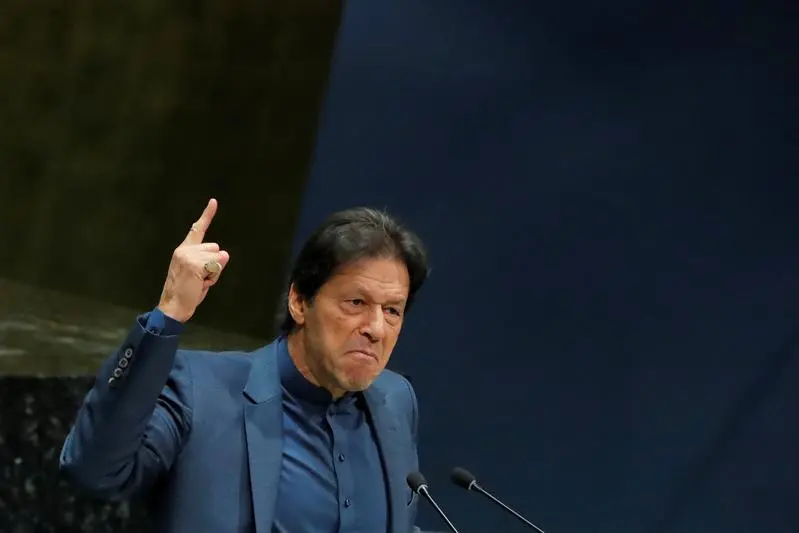PHOTO
Pakistan's anti-corruption agency arrested former Prime Minister Imran Khan at Islamabad High Court on Tuesday, in a dramatic move that threatens fresh turmoil in the nuclear-armed country as his party called for nationwide protests.
Footage of the arrest showed dozens of paramilitary troops in riot-control gear surrounding Khan and leading him into a black van by his arm.
Khan's arrest comes a day after the powerful military issued a rare public rebuke of the former premier for repeated accusations against a senior military official of attempting to assassinate him and the military's former chief of being behind the move to remove him from power.
A high court in Islamabad has summoned authorities to explain Khan's arrest on court premises. Tensions ran high in major cities following the arrest.
Hundreds of supporters blocked streets in Khan's home town of Lahore, where police have been put on high alert, as well as the northwestern province of Khyber-Pakhtunkhwa. Protesters also blocked a major road in the port city of Karachi, according to Reuters witnesses.
'SHUT DOWN PAKISTAN'
Khan will be brought before an anti-graft court on Wednesday, GEO TV said.
Khan's Pakistan Tehreek-e-Insaf (PTI) party called on supporters to "shut down Pakistan".
"It’s your time, people of Pakistan. Khan has always stood for you, now its time to stand for him," the PTI wrote on Twitter.
Khan, 70, a cricket hero-turned-politician, has showed no sign of slowing down since he was ousted as prime minister in April last year, even after being wounded in a November attack on his convoy as he lead a protest march to Islamabad calling for snap general elections.
His arrest comes at a time when ordinary Pakistanis are reeling from the worst economic crisis in decades, with record high inflation and anaemic growth. An International Monetary Fund bailout package has been delayed for months even though foreign exchange reserves are barely enough to cover a month's imports.
Previous attempts to arrest Khan from his Lahore home resulted in heavy clashes between his supporters and law enforcement personnel.
The PTI said it had called an emergency meeting of senior leaders to discuss their response to the arrest.
'LAND FRAUD'
Interior Minister Rana Sanaullah told reporters that Khan had been arrested by the National Accountability Bureau (NAB) after he did not appear "despite notices".
He said the charges against Khan were that he and his wife had received land worth up to 7 billion rupees ($24.70 million) from a land developer that had been charged with money laundering by British authorities.
He added that British authorities had returned 190 million pounds ($240 million) to Pakistan in connection with money laundering, which Khan then returned to the land developer instead of keeping it in the national exchequer.
Khan had denied wrongdoing.
The NAB issued Khan's arrest warrant on May 1, according to an order seen by Reuters. "Khan is accused of commission of the offence of corruption and corrupt practices," it said.
The graft case is one of more than 100 registered against Khan since he was ousted from power in a parliamentary vote. He served four of his five-year term.
In most of the cases, Khan faces being barred from holding public office if convicted, with a national election scheduled for November.
STAND-OFF WITH MILITARY
Political infighting is common in Pakistan, where no prime minister has yet fulfilled a full term and where the military has ruled for nearly half of the country's history.
Despite the military's rebuke on Monday, Khan hit back on Tuesday morning, repeating his allegations and adding that the same officer, Inter Services Intelligence (ISI) Major-General Faisal Naseer, was responsible for the murder of a renowned Pakistani journalist in Kenya in October.
The military has denied Khan's allegations. The former PM's aide, Fawad Chaudhry, directly accused the military authorities of being behind Khan's arrest.
The military remains the country's most powerful institution and has ruled the South Asian nation directly for close to half its 75-year history through three coups. Despite its large influence, it recently said it was no longer interfering.
Khan and the military fell out in 2021 after years of close cooperation. Khan's opponents and many prominent critics say Khan was helped to power by the military in the 2018 elections. Khan denies this.
(Reporting by Asif Shahzad and Gibran Peshimam; Writing by Shivam Patel; Editing by Andrew Heavens, Krishna N. Das and Nick Macfie)





















